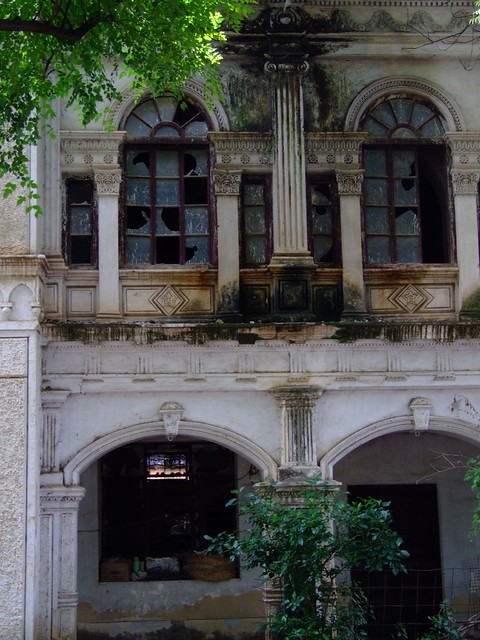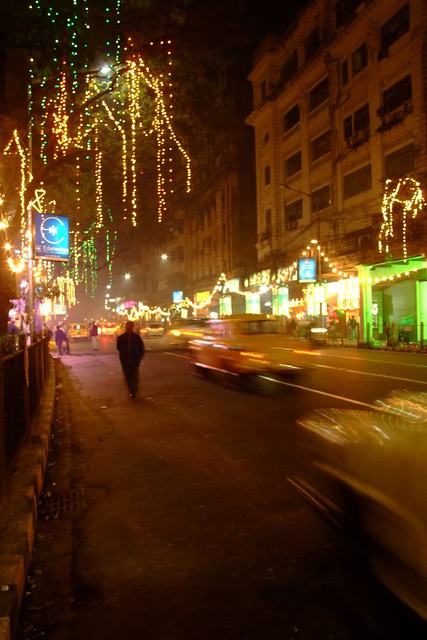My earliest memory of food is in Cafe di Monico. Nestled in the old
corporate switchboard of Calcutta—Chowringhee, it was one of those crumbling
dark-wood establishments my father loved from his first years as a
budding public servant in the area. I must have been four when I first
went there. The tables had wobbly legs supported by cardboard chips torn
off from matchboxes, and blue enameled tin ashtrays on the centre.
Their specialities were mutton cutlets and Hakka-style Chinese. I had my
first proper eating out experience: fried rice and sweet sour chicken
there. The gravy in the chicken was red, almost taking on an unearthly
neon hue, which I thought was incredible. Red chicken! We finished with
fizzy Campa Cola, served in thick bottomed glass tumblers, the sort that
have a greenish ferrous tint when you look at them sideways. Cafe di
Monico was dimly lit in amber light, with ancient fans hung from spidery
beams on the high ceiling. The waiters always dressed in white. I was
growing up in a small town in central Bengal, and these first brushes
with the big city were the best part of summer vacations.
When we moved to Calcutta in 1990, I was lucky to have been able to shuttle between my grandfather's house in a suburban village and my mother's family home in Calcutta—College Street. The University neighbourhood at College Street holds in its belly one of the biggest secret food hubs of the city, and I was growing up in it. Every morning, I walked down till Sealdah in my white school shorts to catch the school bus. Breakfasts often meant sweet Bapuji tiffin cake and milk. At four in the afternoon, when I made my way back under the watchful eye of my mother, the smell of crumb-fried fish chops frying at the Amherst Street intersection took over the air. My cousin, older by five years, once sneaked in two of these small, cylindrical morsels. We hid away to the rickety, asbestos-lined terrace. We downed the chops in silence, secret glee in our eyes and smell of mustard in our hands. Ashen clouds broke in soft, watery pats on the asbestos.
When we moved to Calcutta in 1990, I was lucky to have been able to shuttle between my grandfather's house in a suburban village and my mother's family home in Calcutta—College Street. The University neighbourhood at College Street holds in its belly one of the biggest secret food hubs of the city, and I was growing up in it. Every morning, I walked down till Sealdah in my white school shorts to catch the school bus. Breakfasts often meant sweet Bapuji tiffin cake and milk. At four in the afternoon, when I made my way back under the watchful eye of my mother, the smell of crumb-fried fish chops frying at the Amherst Street intersection took over the air. My cousin, older by five years, once sneaked in two of these small, cylindrical morsels. We hid away to the rickety, asbestos-lined terrace. We downed the chops in silence, secret glee in our eyes and smell of mustard in our hands. Ashen clouds broke in soft, watery pats on the asbestos.
The house in College Street was always jingle-jangle in the mornings with the sounds of pigeons, neighbours brushing their teeth, and the stylised call of street vendors, "Kabaaaadeeeee!" My grandmother kept a set of iron keys at the end of her white saree, which clinked every morning when I headed to school. Growing weaker every year, she appeared at the soot-lined kitchen on rare days. She chopped vegetables with patience and could carve the thinnest potato slices, which she served crisp-fried with sweetened dal and rice. I do not know of anyone who can ever get that balance of panch-phoron right.
At
the village house, we would pick sharp, unripe guavas from the tree.
Stealing a sliver of salt from the kitchen was difficult but we managed
just fine, rubbing coarse, pink salt grains on the guavas on muggy
summer days. My father's mother, Amma, made sun-dried pickles, mango,
lemon, and tamarind. The dark, spiced fruit would be heaped on the
oxide-red cement beside the pond. Though we were supposed to be snoozing
inside, we stole out into the hot sun and always returned with a
handful of tamarind, spitting out the seeds as we wolfed down on the
uncured pickle.
Before
summer vacations in school, an old man with glassy eyes stood in a shade
every afternoon at the Short Street crossing. He sold spiced jujube
fruit in tiny paper bags, dusted with black salt and chilly. They had a
sulphur tang and turned your mouth red. Not allowed pocket money, I
scraped under the mattresses for loose change. If I ever got lucky, two
Rupees got you a handful of the forbidden stuff from the old man. On
lucky days, you could spot a wiry young man sitting beside a dirt-lined
thermocol box, selling "kathi pepsi"—esoteric ice lollies trapped in a
thin plastic sheath for a rupee each. I didn't care for my frequent
tonsilitis, and occasionally returned home with a bright orange dribble
mark on my shirt pocket, Best guilty pleasures ever. On days when I had
fever, my mother made bone stew, slowly cooking goat shanks in a broth. I
would refuse to eat rice, stubbornly mouthing down hot spoonfuls of the
stuff down my bilious, bitter throat. It's the best memory I have of
sickness and school.
When I
was 17 and had enough money of my own, I walked the 800-yard mark to
Park Circus on a cold January evening and rode a bus till Chowringhee.
The sun had set long ago, and a non-committal mist was pushing from the greens
on to the halogen-lined footpath. It had been a little over ten years
that Cafe di Monico downed its shutters, and the guava tree in the
village house was long gone. I walked the stretch across brick-red
Georgian porticos perpetually plastered with revolutionary slogans,
dodging pushcarts and pullover sellers. I called my mother from a phone
booth, and told her I'll be late for dinner. When I knew I was out of
plain sight, I trudged to a quiet corner away from Dalhousie, and lit a
cigarette.




3 comments:
There's something so tangible and palpable in your words, yet something that is so beyond reach. Brilliant! Loved it!
Very evocative, and there's a lot of feeling behind what you've written. Loved it.
I want:
a) A larger photo of the College Street house. It seems beautiful.
b) A post completely devoted to the food hub that is the College Street area. In fact, a post devoted to each area in Cal that you're familiar with.
Thanks both. Good to know this made sense the way I saw it in my head.
Daisy, the photo sadly is indicative. I don't have any photos handy of the College Street house. This photo is from Hyderabad. You could check out my Flickr stream for a larger version.
A post on College Street food is not a bad idea at all. I'm just not sure if I have enough photos to support the text. Soon.
Post a Comment